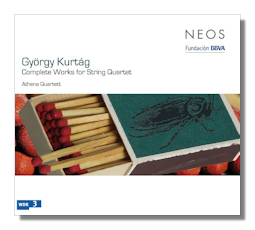
The Internet's Premier Classical Music Source
Related Links
- Kurtág Reviews
- Latest Reviews
- More Reviews
-
By Composer
-
Collections
DVD & Blu-ray
Books
Concert Reviews
Articles/Interviews
Software
Audio
Search Amazon
Recommended Links
Site News
 SACD Review
SACD Review
György Kurtág

Complete Works For String Quartet
- Arioso – Homage à Walter Levin 85 *
- Six Moments musicaux, Op. 44 1*
- Homage à Jacob Obrecht *
- Officium breve in memoriam Andreae Szervánszky, Op. 28
- Aus der Ferne V *
- Homage à Mihály András, Op. 13
- Aus der Ferne III
- String Quartet, Op. 1
1 Hanna Klein, viola
Athena Quartet
* World première recordings
Neos SACD 11033
This important SACD from NEOS of all of the works by György Kurtág for string quartet, which is not the same as all of Kurtág's String Quartets (in fact only one is so named) is superbly played by the Athena Quartet with Hanna Klein's second viola in the Six Moments musicaux. These are typical of the pared-down, refined, concentrated world in which Kurtág felt so at home and in which he picked up the influence of Webern, albeit a rougher, more ragged, impromptu Webern. Together with the other seven works on this SACD (half of which are world première recordings), these short works are played with panache, spontaneity and a real sense of presence (yet they are all studio recordings). In the Moments musicaux with the allusion to composers such as Beethoven and Schubert from the Classical period another trait of Kurtág's is evident: a recollection of the past. It's not so much a memory, still less a veneration, of earlier music. More an expressionistic and highly exposed exercise in absorbing the past.
Although Kurtág's music is full of respect. It's not iconoclastic; nor does it consciously seek to adapt anything which has influenced him. Rather, it aims – often with an overt and potentially painful effort – to render whole what might otherwise be fragmented because of its influences. In the case, for example, of the eleventh, sostenuto movement from the Officium breve in memoriam Andreae Szervánszky, Op. 28 [tr.20], the rawest of sounds from the mid strings in particular is produced unashamedly… the unadorned essence of the violin's lower notes and those of the viola. It's as though the genuineness of that sound (the Athenas are miked closely in these recordings) constitutes a reality that reflects the common factors possessed by all other instances of the instrument(s) in question. Rather like Beethoven's solo strings and Schubert's piano.
Kurtág also aims for speech-like feelings; for the rhythms and phraseology of human utterance. Another reference to something outside the music. Just as the Homage à Mihály András [tr.s 26-37] acknowledges not only earlier music of Kurtág's; but also that of Bach and Bartòk. None of what we hear on this stimulating and exciting CD, though, is in any way derivative, or "secondary". Indeed, it's all highly original and creative music. What's more, the Athenas (Germany-based, formed in 1999) have the gift of playing it as though the composer were at their collective elbow so real, immediate and alive yet striking is their thorough control of tempi, texture and timbre.
Their fearless approach to the slow movements in these pieces (which is the majority, is has to be noted) indicates a span of technique that better than reproduces – is recreates – the tension between calm and anxiety which surely lies at the heart of Kurtág's string writing. The plaintiveness is not that of Shostakovich. The calm not that of Sibelius. Yet there is an analogous disparity between the open, the spacious, the free on the one hand; and the claustrophobic, the obsessive and the neurotic on the other. This could all too easily run away with less experienced and committed players: all the scope for taking some of the music's "determination" as mere effect is there. Yet in fact the Athenas approach such pieces as the two Aus der Ferne (III and V) with an almost tender, colorful care.
Indeed, much of Kurtág's music is so vivid and sinuous (the two Berg-inspired Arioso – Homage à Walter Levin 85 [tr.s 1,45], for instance) that it's almost as visual as it is verbal. Again, it's to the credit of the Athenas that this is such a vivid, clean and meaningful juxtaposition of sound and ideas. Above all, these are performances which do more than reproduce a searing regretfulness of the sort in which, say, Gubaidulina is so practiced. Still less do they merely acknowledge implicitly that loss and despair can be the strong forces which they can. It was surely Kurtág's intention to recreate these (and other often very basic) emotions in his music. It needs performers who can rebuild and present that recreation. Kurtág has found them in the Athena Quartet (Saskia Viersen, violin; Margherita Biderbick, violin; Miriam Götting, viola; and Kathrin Bogensberger, cello).
The acoustic, then, is painstakingly well-suited to the import of this intimate and invasive music. There is little extraneous atmosphere. The result is that the listener's experience seems to have been personalized. The booklet accompanying the SACD is informative and explains the context of the composer as experimentalist and architect well. Even were these not virtually the only available recordings of these works (there are two recordings of each of the Officium breve and Aus der Ferne III as well as those and the Homage à Mihály András and String Quartet Opus 1 by the Keller String Quartet on ECM 1598), they could be recommended for aficionados of Kurtág immediately. And ought to be given a try for anyone interested in the more original paths down which contemporary string writing leads us.
Copyright © 2011, Mark Sealey.





















